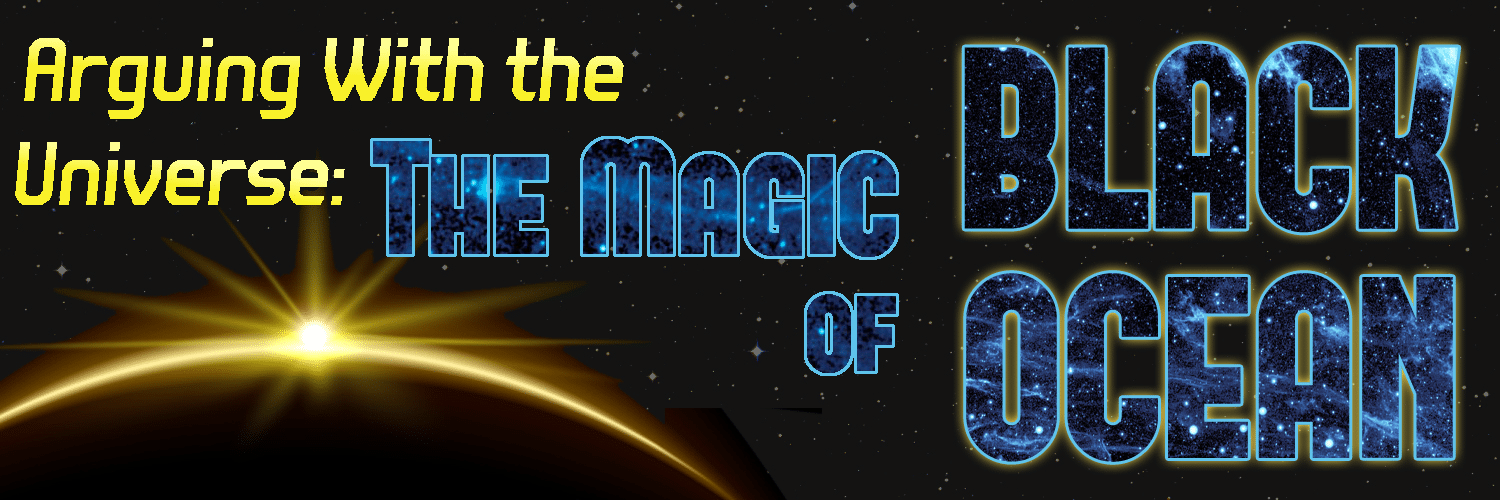With the release of the 5th book in the Black Ocean series (Alien Racer), I figured it was a good time to start talking some about the world-building behind the series. Let’s talk magic.
The Setting
With all the trappings of a Star Trek or Firefly universe, it would be easy to assume that Black Ocean was straight science fiction. But it’s not. Most of the technology that gets hand-waved in mainstream science fiction (FTL travel, artificial gravity, universal translation) are made possible by wizards in Black Ocean. This all came about after the wizarding and scientific communities came to a truce of sorts, allowing the open practice of magic in the name of progress as a species.
Humanity’s interstellar empire couldn’t have come about without starships made by science and accelerated through astral space by wizards.
The System
The universe has a default set of rules: the laws of physics. Scientists attempt to understand those rules. Engineers use that knowledge to create technology based upon them. Wizards seek to alter them locally.
A wizard is a debater. Through strength of will, personal belief, and rhetorical skill, he or she seeks to convince the universe that the laws of physics need not apply to a given circumstance. Thus, a book of spells is less an arcane cookbook (as is the case in many fantasy settings) and more an outline of arguments and debating tactics that have produced successful results in the past. Simply reciting words or pointing and waving your arms around isn’t enough to produce a result. The universe is no fool, and won’t accept a hollow argument. A wizard needs to be steadfast in his own belief that his argument is right. It is a profession where arrogance and self-confidence are key.
How Magic Affects Science
The more complicated a device is, the more reliant it is on the laws of physics behaving in a very precise manner. An atomic clock is more reliant on consistent physical laws than spring-wound pocket watch. A microwave oven is more sensitive than an electric toaster. When a wizard alters the surrounding physics to produce levitation, conjure fire, or crush something with a localized gravitational change, nearby devices can go haywire. How far this effect reaches and how damaging the aftermath depends on several factors. How much did the wizard alter physics? How subtle is the wizard’s control? How robust is the device in question? Are there any protections in place to stabilize local physics?
Magical devices are less catastrophic toward technology. Permanent (or semi-permanent) magical objects aren’t in a state of flux. The laws of physics may not apply to them, but nothing is actively changing those laws around them. Thus on most ships, a gravity stone and star-drive are used in place of a wizard casting spells to achieve the same effects.
How Wizards Deal With Technology
An active understanding of physics, chemistry, or any other science works at cross purposes with magical knowledge. A wizard must believe the universe to be mutable, open to negotiation, and most certainly not bound by fundamental theoretical formulas describing its every working.
This puts wizards in a quandary with regards to modern life. Many shun technology altogether, while others blunder about operating devices they don’t understand. It doesn’t take any scientific understanding to watch a holovid or talk over a comm link, but anything beyond the most basic of functions will baffle most wizards. In fact, the more powerful the wizard, the less likely he is to be able to deal with technological devices.
Wizards and Society
Wizards fit poorly into modern society. They are utterly essential for maintaining the modern way of life that humans are accustomed to, but the beneficiaries of their magical prowess are uncomfortable around them. Wizarding organizations largely police their own membership (since a wizard would wreak havoc on conventional police), and have an uneasy relationship with civilian law enforcement. At the highest levels of government, wizards are consulted on topics such as terraforming, military defense, and diplomatic relations with alien races who hold magic in high regard.


Thanks for fleshing this out mate. I loved Firehurler (positive review coming as soon as I have a spare moment), and went looking to see what else you had available.
I need to get back in my wife’s good graces before I can buy some more books after the last big binge-buy, so I picked up War-Bringer and Tech, Lies, and Wizardry since they were free. I assumed the wizardry in the title was along the lines of “computer wizardry” so was a little confused just for a moment later in the book.
I like the way you’ve woven them together now I’ve a better handle on what’s going on.